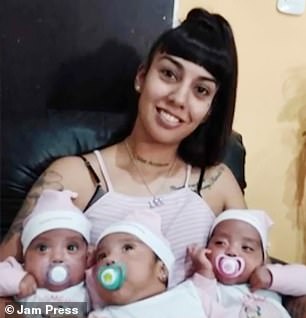
The three girls — named Damaris, Aymara and Emily — were born two months early in Buenos Aires, Argentina, to their mother Melany Basualdo, 32
When Melany Basualdo calls her daughters one-in-a-million, she won’t be exaggerating.
The 32-year-old gave birth to identical triplets — now nearly seven months old — on August 5, 2023 in Buenos Aires, Argentina, in what doctors say is a rare occurence.
While most identical triplets are conceived through in vitro fertilization, what makes Ms Basualdo’s case so rare is that she conceived the trio naturally.
The three baby girls — Damaris, Aymara and Emily — were born 10 weeks early, which is typical for a pregnancy with multiple babies because they are more likely to rupture protective membranes early.
The girls were delivered naturally within moments of each other and ranged in weight from 3.4lbs to 3.11lbs — compared to the average 8.6lbs at birth — although it is common for twins or triplets to be smaller.
Following delivery, each baby was put on oxygen to support their lungs and growing organs — but they were discharged after a few weeks.
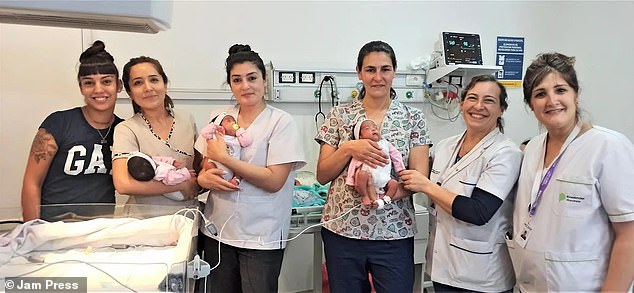
Pictured above is mother Melany (far left) and hospital staff with her three babies. They were on oxygen for a few weeks before being allowed to go home
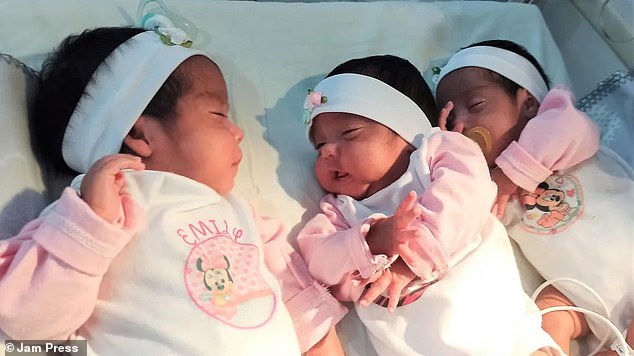
The three girls are ‘complicated’ to care for, said their mother, although they are all ‘very-well behaved’. They are now six months old
There are two types of multiple pregnancies: fraternal and identical.
Fraternal babies occur when multiple eggs become fertilized at the same time by different sperm, whereas identical pregnancies are when one fertilized egg splits into two or more embryos that carry the exact same genetic makeup.
In the case of the triplets in Argentina, one of their mother’s eggs became fertilized with one sperm and split into three embryos.
There are about 4,300 triplets born in the US every year out of 3.9million births — equivalent to 0.1 percent of all births recorded.
But only a handful of these are identical, with just four reported in 2015 — equivalent to one in a million.
Multiples are more common in IVF fertility procedures because more than one embryo is put back into the mother.
While born at just 30 weeks – a full-term pregnancy is considered 39 to 41 weeks – more than 98 percent of infants born at this stage survive because most of their organ systems are already well developed.
Ms Basualdo said caring for the three girls was ‘complicated’ but that they are ‘very well behaved.’
The babies are also still small enough to share one crib.
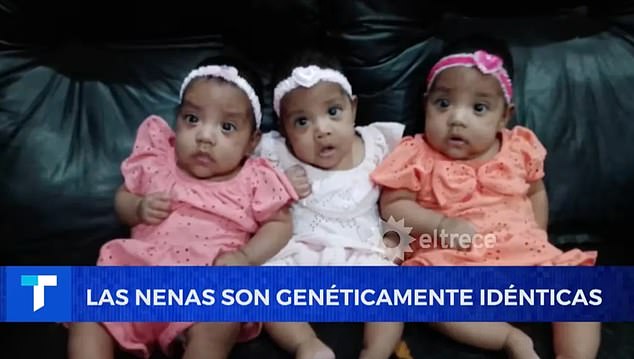
The three girls go through about 15 diapers a day, their mother said, and are currently all small enough to sleep in the same crib
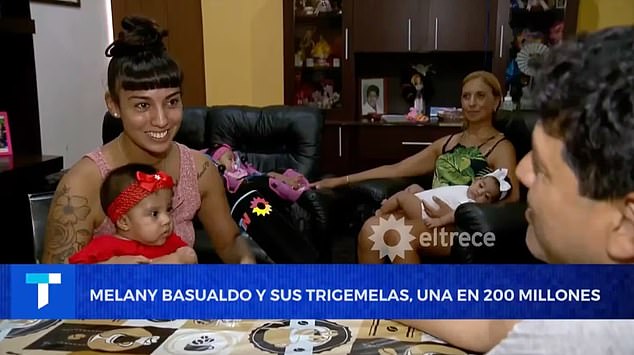
She revealed their births to a local news station. Sitting in the background is her mother Marcela Frias who said the babies are the ‘light of my life’
Ms Basualdo said: ‘It’s a complicated job, but I’m handling it well. They’re very well-behaved.
‘Despite a complicated pregnancy, everything went well and they are healthy.
‘I’m happy to have them, it’s a blessing, an immense source of pride for me.’
The mom did not detail her pregnancy complications, but women carrying more than more child are more likely to face problems such as gestational diabetes and pre-eclampsia — a condition that causes high blood pressure and can lead to damage to organ systems such as the kidneys.
Ms Basualdo’s mother Marcela Frias is also thrilled by the births, saying: ‘It’s the best thing that could have happened to us.
‘They are the light of my life, I love them with all my soul. They are my life.’
Local reports showed both mother and grandmother beaming as they held the infants for cameras.
Ms Basualdo’s story comes after a couple in England were left ‘over the moon’ when they had identical triplets in March last year.
The three baby girls — named Harper-Gwen, Marvella and Evalynn — were conceived naturally and delivered nine weeks prematurely at York Hospital.
Jenni Casper, 27, and her husband James, 26, had initially been told they were expecting twins, the chances of which are roughly one in 250.
But the couple said they were left speechless when they discovered at a 12-week scan they would be having triplets instead.
James, a trash can collector from Selby, North Yorkshire in England, said the whole situation is a little bit ‘surreal’ but ‘amazing.’
He said: ‘Now we’re at home and we’ve settled in with them, it’s a bit surreal.
‘But we’re just overwhelmed and they’ve met their older sisters who are absolutely over the moon and are just so excited.’

